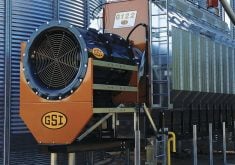Engineers working on grain drying technology said alternatives to fossil fuels are years away.
William David Lubitz, associate professor at the University of Guelph’s school of engineering, and Chandra Singh, senior research chair in agricultural engineering and technology at Lethbridge College, told the Senate agriculture committee that farmers have no viable replacements for propane and natural gas.
“Propane and natural gas are the only two practical fuel sources for grain drying in western Canada,” Singh said Oct. 5, adding that he is in favour of exempting the fuels from carbon pricing.
Read Also

New coal mine proposal met with old concerns
A smaller version of the previously rejected Grassy Mountain coal mine project in Crowsnest Pass is back on the table, and the Livingstone Landowners Group continues to voice concerns about the environmental risks.
Lubitz said he has worked on projects with farmers in southern Ontario and with the province. On one farm, they are researching air source heat pumps and with Grain Farmers of Ontario, they are building a prototype.
A survey in 2021 found all the respondents used propane or natural gas. Propane was more expensive, and energy costs and security are significant concerns.
“We only identified two possible alternatives for energy supplies that were not fossil fuels, and that was biomass or biofuels or electricity, which is what we worked on with the heat pumps,” said Lubitz. “I’ll note that both of those have infrastructure limitations on farms.”
Heat pumps need a sure supply of electricity, which could have implications for the grid.
“We believe that this technology has a lot of potential and we will be able to commercialize it, but we have multiple years to go before we reach a scale where farmers would be able to buy this in quantity,” he told the committee.
The committee is studying Bill C-234, a private member’s bill that would exempt propane and natural gas from the carbon tax when used for grain drying or to heat barns.
Lubitz said some alternative technologies are nearly ready for prototype and experimental use but not for large-scale farm use.
He said some could be ready within the eight-year window the bill provides for the exemption but not in the next year or two.
Singh said he sees no new technology coming that will be able to handle the volume of grain that potentially needs to be dried each year.
“Heat pumps and biomass are being used in many Asian countries, but the farm sizes are very small, literally, so they can use it there,” he said.
Another problem in Canada is timing. Grain has to be properly dried at harvest time to maintain condition during storage.
Singh said many farmers upgrade their drying systems, when able. Incentives cover a part of the cost but many aren’t aware of the programs that offer money to upgrade.


















